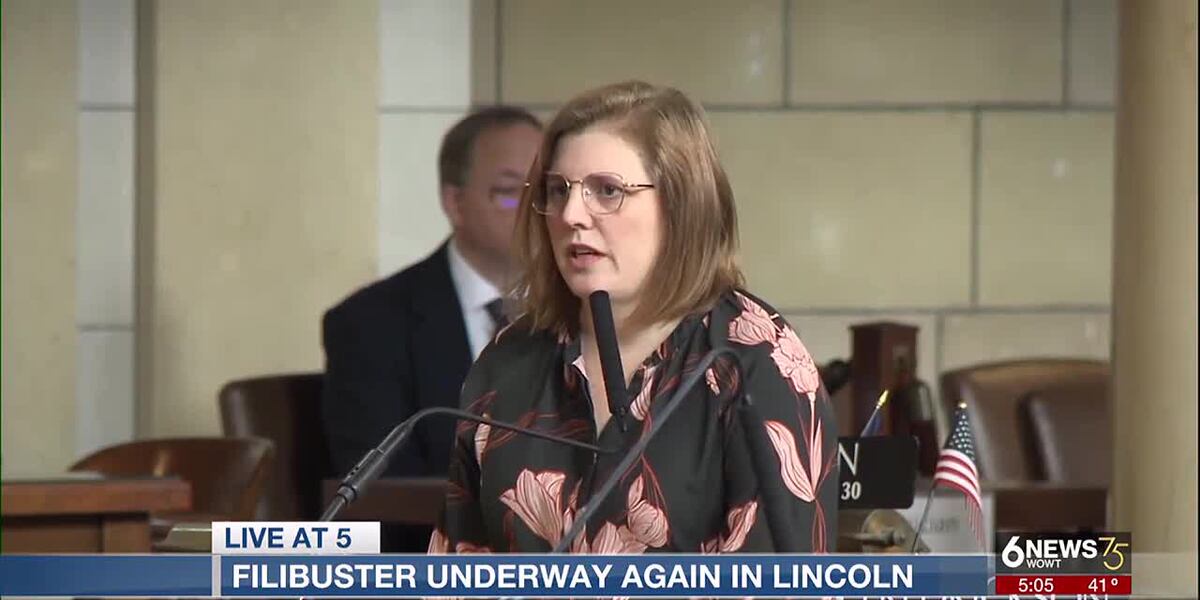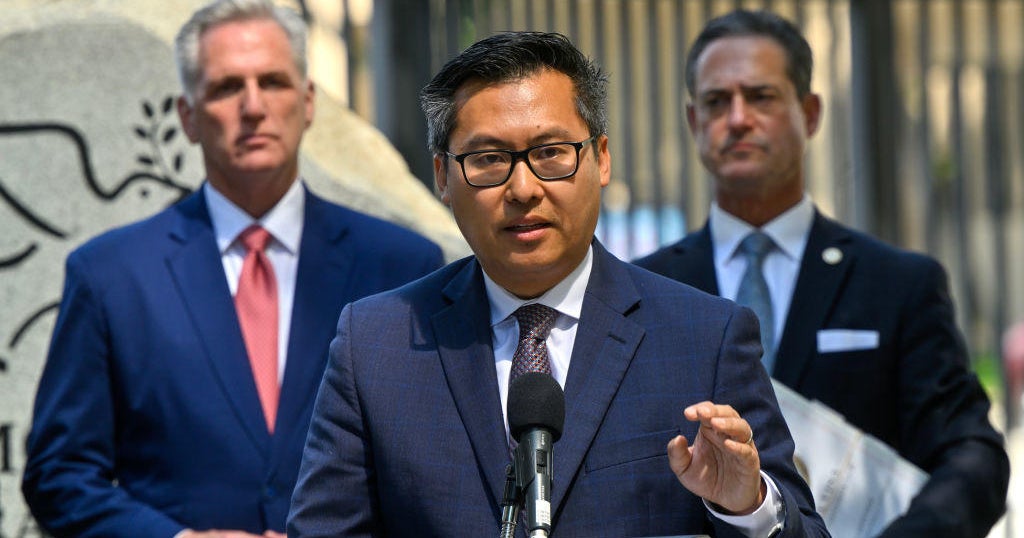Nebraska
Filibuster returns to Nebraska Legislature over bill targeting fentanyl crisis

LINCOLN, Neb. (WOWT) – The filibuster came roaring back to the Nebraska Legislature on Monday. It surfaced early in the day centered on a bill about crime and punishment.
Monday morning’s debate at the unicameral began over LB137, a bill that would hold drug dealers accountable in the midst of a fentanyl crisis.
The bill is sponsored by State Sen. Carolyn Bosn of Lincoln, legislation championed by her predecessor, Suzanne Geist. She says 12 states have these enhanced penalties to tackle the epidemic.
But she received pushback from a number of senators, including the chief organizer of last year’s session-long filibuster: State Sen. Machaela Cavanaugh of Omaha.
“I don’t think that this is going to help us address our opioid crisis in this state, and we have a severe prison overcrowding,” she said. “Creating enhanced penalties does not seem like a thoughtful way to approach the crisis.”
Sen. Cavanaugh’s filibuster last year centered on the Republican majority going after reproductive healthcare in women and healthcare for transgender youth.
Other senators made it known Monday that they would gladly filibuster too.
“There’s going to be enough amendments that I’m going to take up four hours, but I want votes,” said State Sen. Justin Wayne of Omaha. “Let’s put people on record, where their conscience really is when it comes to certain things. If we’re going to attack this from all sides, well stated on the floor by the introducer, then let’s put votes on this. For example, let’s put a vote on Sen. Hunt’s bill. Let’s bring that back up. There’s enough for a majority. Let’s put it on this bill.”
Sen. Wayne pointed out a bill from State Sen. Megan Hunt of Omaha that had overwhelming support a couple weeks ago. LB307 would have permitted cities to participate in a needle-sharing program to get addicts the help they need — legislation that’s law in 45 other states.
Seven of Hunt’s colleagues changed their minds last week after the Governor’s team pushed to block the bill, and never spoke about it. Sen. Bosn, the sponsor of Monday’s bill, was one of them. That’s why Sen. Wayne said they should file all these bills under the same umbrella — along with the conversation about how opioid use drops in states where marijuana is legal.
After several hours of debate, the original bill was not taken up for a vote.
Copyright 2024 WOWT. All rights reserved.

Nebraska
Ex-Nebraska Scouts leader accused of child sex crimes enters plea

OMAHA, Neb. (WOWT) – A former Nebraska Boy Scouts leader accused of child sex crimes entered a plea in federal court Thursday.
John Shores, Jr., 54, pleaded guilty to one count of attempted sexual exploitation of a minor. He faces 15-20 years in prison as part of the plea agreement, which included the dismissal of several similar charges. Acting U.S. Attorney Susan Lehr reminds the public there is no parole in the federal system.
In August 2023, Shores used the social messaging platform Whisper to communicate with an undercover officer posing as a 13-year-old female.
Shores asked the officer to exchange naked pictures and eventually arranged to meet with the user, fully under the belief that he’d be encountering a teenage girl. When Shores arrived at the location where they arranged the meeting, officers seized four phones from his vehicle.
The devices underwent forensic examination, which revealed that in July 2020, Shores had conversed with an actual 13-year-old girl living in southeastern Nebraska, who investigators were able to identify.
Shores had previously been associated with the Boy Scouts, but officials with the organization confirmed shortly after the initial allegations last August that he was no longer involved.
Shores is scheduled to be sentenced Aug. 23.
Copyright 2023 WOWT. All rights reserved.
Nebraska
Years after landmark study, number of missing Natives in Nebraska has nearly doubled

LINCOLN — Lestina Saul-Merdassi still remembers the question she asked herself when her cousin went missing.
Will someone in power try to find him? Will anyone?
Her cousin, Merle Saul, went missing from Grand Island in 2015. He’s one of an estimated 4,200 unsolved cases of missing and murdered American Indians and Alaska Natives nationally, as reported by the Bureau of Indian Affairs.
“I feel like he was basically written off as a transient, written off because he suffered from alcohol-related issues,” said Saul-Merdassi, an Omaha resident and member of the Sisseton Wahpeton Dakota Oyate Tribe, during a 2023 legislative hearing. “People did not take into consideration that he is a United States veteran, and he risked his life in the Vietnam War for this country.”
In 2019, the Nebraska Legislature sought to better understand the reason behind the disproportionate number of missing Indigenous women and children in the state. Lawmakers directed the Nebraska State Patrol to investigate and produce recommendations to address the issue.
Five years later, few of those recommendations have been implemented. And the number of reported cases of missing Indigenous people in Nebraska has jumped from 23 in 2020 to 43 in 2024.
Law enforcement, state officials and activists offered a range of explanations for the rise in reported cases and seeming inaction on the report’s recommendations.
Better counting and awareness could be behind part of the increase in known cases, the patrol said.
Leadership changes, the COVID-19 pandemic, historical distrust, and coordination challenges among law enforcement agencies have complicated progress, the report’s authors said.
“Progress is not as fast as I would always like it to be, but I do believe that we are making progress,” said Judi gaiashkibos, a member of the Ponca Tribe and director of the Nebraska Commission on Indian Affairs, which worked with the patrol on the report.
The report, released in 2020, put Nebraska at the forefront of states on the issue of missing Indigenous people. At the time it was only the second state in the country to mandate a report investigating these disparities.
It uncovered some surprises – including that rates of missing African American and Indigenous boys and men outpaced the rate of missing Indigenous women. Other states undertook similar investigations, some using research methods first developed and used in the Nebraska report.
Many of those other states have acted on their recommendations. Nebraska, for the most part, has not.
“When I look at the finished project and everything that I learned from it, it’s one of the things I’m most proud of, but at the same time, it’s also one of my biggest failures because we didn’t see it through,” said former Capt. Matt Sutter, who led the report for the patrol.
A need for action
When lawmakers passed their bill in 2019 (Legislative Bill 154), Indigenous women and girls in Nebraska were reported missing at one of the highest rates in the country.
A 2018 analysis by the Urban Indian Health Institute indicated that 10% of Indigenous missing persons cases reported across 71 cities in the U.S. originated from Omaha and Lincoln.
“We needed somebody to do something,” recalled Omaha Tribe member Renee Sans Souci, one of the founding members of Native Women’s Task Force of Nebraska, a grassroots group dedicated to raising awareness about the issue.
The investigation required by the Legislature involved a series of well-attended listening sessions in Omaha, Santee, Macy, and Winnebago. Tribal and non-tribal residents attended, as did law enforcement and other organizations.
“We were there. And we were listening,” said patrol investigator Tyler Kroenke, who was then the lieutenant of a patrol area in northeast Nebraska that overlaps with reservation land.
The resulting report identified three primary issues: jurisdictional uncertainty; lack of communication between law enforcement agencies; and racial misclassification of missing people.
And it identified contributing factors: poverty, high rates of domestic abuse, high levels of substance abuse and geographic isolation in some Native communities.
Sans Souci already knew this.
Months before the report was released, Sans Souci’s niece, Ashlea Aldrich, 29, was found dead in a field near her boyfriend’s house, according to local news reports. The family told the Sioux City Journal that they had made dozens of calls to tribal police over the years with concerns about possible domestic violence against Aldrich, but said nothing was done.
The death certificate obtained by the Journal listed her immediate cause of death as “hypothermia complicating acute alcohol toxicity” and characterized her death as an “accident.” Aldrich’s family disagrees.
“We have to be our own detectives, our own attorneys, and often it’s the families who have to search for their missing loved ones,” Sans Souci said. “My sister has to live with that every day.”
Four years after Aldrich’s death, activists said uncertainty and a lack of trust persist.
“I believe some of that could go back to colonization and the U.S. Calvary, and how they violated our people, our women and our rights,” Saul-Merdassi said.
Nebraska
Former Nebraska news anchor sentenced to jail for threats

LINCOLN, Neb. (KLKN) — A former central Nebraska TV news anchor will spend several weeks behind bars.
Joseph Scanlan, 27, was sentenced Thursday for sending threatening text messages to a woman.
Buffalo County Judge Gerald Jorgensen Jr. sentenced him to three consecutive 90-day jail terms.
But Scanlan will only serve 60 days, with credit for two days served, initially.
Then he will be on probation until Feb. 1, when his jail time is scheduled to resume.
But the judge may suspend the rest of the jail sentence, according to court documents.
SEE ALSO: Former anchor at central Nebraska TV station accused of threatening woman
Scanlan will also spend two years on probation.
He is required to undergo counseling and take anger management and self-control classes, court records say.
Scanlan was a morning anchor at KSNB in Hastings.
On Dec. 1, a woman filed for a protection order against Scanlan.
She said he had been harassing her since September through texts, social media and handwritten notes.
He even used a KSNB account to message her, according to the protection order request.
The woman said he was fired because of that.
A judge granted the protection order, but Scanlan violated it, launching the criminal case against him.
He pleaded guilty to reduced charges in March.
-

 News1 week ago
News1 week agoRead Prosecutors’ Filing on Mar-a-Lago Evidence in Trump Documents Case
-

 Politics1 week ago
Politics1 week agoMichael Cohen swore he had nothing derogatory on Trump, his ex-lawyer says – another lie – as testimony ends
-

 News1 week ago
News1 week agoVince Fong wins special election to finish term of former House Speaker Kevin McCarthy
-

 News1 week ago
News1 week agoVideo: Midwest Storms Destroy Homes
-

 World1 week ago
World1 week ago€440k frozen in Italy over suspect scam by fake farmers
-

 News1 week ago
News1 week agoBuy-now, pay-later returns and disputes are about to get federal oversight
-

 News1 week ago
News1 week agoRead the I.C.J. Ruling on Israel’s Rafah Offensive
-

 News1 week ago
News1 week agoVideo: Protesters Take Over U.C.L.A. Building




















